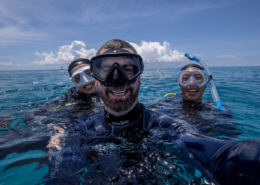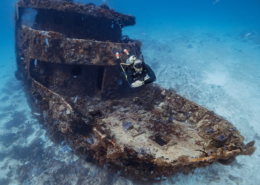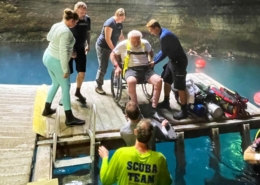I’ve Earned an Open Water, Now What?
By: Jessica Brown
Congratulations! You just earned your Open Water Scuba Diver Certification, but now what do you do with it? Well to answer your question in the vaguest way possible… you can do almost anything! Was that not the answer that you looking for? Okay, I will elaborate more.
Local
- Improve your skills
- Increase your confidence
- Understand your gear
- Become a better buddy
Now that you are Open Water certified, you can take a buddy and go out to your local lake, quarry, beach, etc. Going to your local dive spot will allow you to hone in those skills so you can eventually master them and feel like a pro. Feeling more confident in the water will allow you to explore a little bit more and see things that you’ve never noticed before. You can chat with your local dive shop and see what places they recommend. Sometimes, they will do guided dives if you want to have a professional with you at a new site. Your local shop can also help you select the proper gear for your area.
While practicing your skills, you will start to understand your gear. What does that mean? You can explore your dive computer (some have some pretty neat settings), get your weight down (not your body weight silly!), etc. Getting to know your gear allows you to be more confident in the water as well. Becoming really familiar with all of these skills allows you to become a better buddy too. You will begin to know what you are comfortable doing and what you would like to go see in a dive. Then you can communicate that with your buddy. Dives become easier to plan.
Travel
- Doesn’t have to be far
- Learn new skills
- Discover marine life
- Explore new waters
- Meet new people
Tired of the same old place? Well, it’s time to venture out!
This can be a new place that’s just down the road or this could be a destination dive spot (lucky you!). Going to new places also allows you to expand on your skills. If you were certified in a lake, you can go to the ocean and feel current or the waves. Let’s flip that around. If you were ocean certified and go to a lake, you may be taken back by the lack of movement of the water. Also, different areas have different marine life that you can see.
Getting out to a variety of places also allows you to meet new people and let me say, divers, are an interesting group. The diving world is tight-knit. You might run into the same people at a couple of different places. You can check with your local dive shop to see if they do group trips. Most of the time, it’s cheaper to go with a group, and a professional is there to help assist you in your experience…
Education
- SDI (Scuba Diving International)
- TDI (Technical Diving International)
- ERDI (Emergency Response International)
- PFI (Performance Freediving International)
- FRTI (First Response Training International)
- Expanding skills
Do you feel like you’ve mastered your open water skills?
Well, now you have the power to try new things! There are so many classes offered by SDI, TDI, ERDI, PFI, and First Response Training that you can expand on. Wait, what are all of those letters that I just mentioned? Well, you know of SDI, but let me briefly tell you about the others.
TDI tackles more advanced diving such as overhead diving, rebreathers, open circuit, or service. ERDI is a Public Safety Diving (PSD) agency that trains police, fire, and other public safety organizations in search and rescue techniques that apply to almost any submerged environment. PFI offers multifaceted educational Freediving and Breath-Hold Survival courses targeted at snorkelers, freedivers, spearfishers, surfers, special operations teams, and rescue teams. First Response Training International provides CPR, First Aid, and Layperson Rescue Training for caregivers, personal trainers, construction workers, and anyone else who potentially may need these life-saving skills.
Many divers take the open water course and think they can dive anywhere. Well, I hate to be the bearer of bad news, but that is not the case. Some of the places that you would like to dive might be deeper than what you are currently certified. If that’s the case, check out our Deep Diver Course. When doing a deeper dive, you may want to look into Computer Nitrox Diver Course and the possible benefits that nitrox offers a diver. The Night and Limited Visibility Diver Course is also a really good course to take. Why dive at night? The marine life that you see every dive will act differently at night. Different marine life comes out at night (search: marine life at night, some of the creatures are trippy looking). When diving at night or in limited visibility, it would be good to also take the course paired with the Underwater Navigation Course, that way you can always find what you are looking for and find your way back. Underwater Navigation is also helpful in clear water during a bright sunny day. After taking all of those specialty courses (or others) and going out to master your new skills, you will eventually be able to qualify as an Advanced Diver. These courses not only add to your knowledge and understanding of diving, but also build upon your open water certification.
Several courses (even those not connected with scuba diving) expand on the topics covered in the open water course and can make certain things click into place. Having a larger skill base also allow you more freedom in diving and more confidence as well. You will be able to travel to more places and see more with just a few more certifications, but don’t let that stop you from getting as many as you want. Take as many classes as your heart desires! You might find your niche in diving. Ask your local dive shop what classes they offer. Sometimes you might have to travel to take a class, but luckily, many of the classes can begin online and cut down on your travel time.
An Open Water Scuba Diver Certification just opens the first door of many. Go explore your underwater world! Every day is an adventure. You can explore your world in whatever way you would like, as long as you hold that certification and take the proper precautions. You are your only limit.


 William Drumm/ International Training
William Drumm/ International Training William Drumm/International Training
William Drumm/International Training





댓글을 남겨주세요
토론에 참여하시겠어요?언제든지 참여하세요!